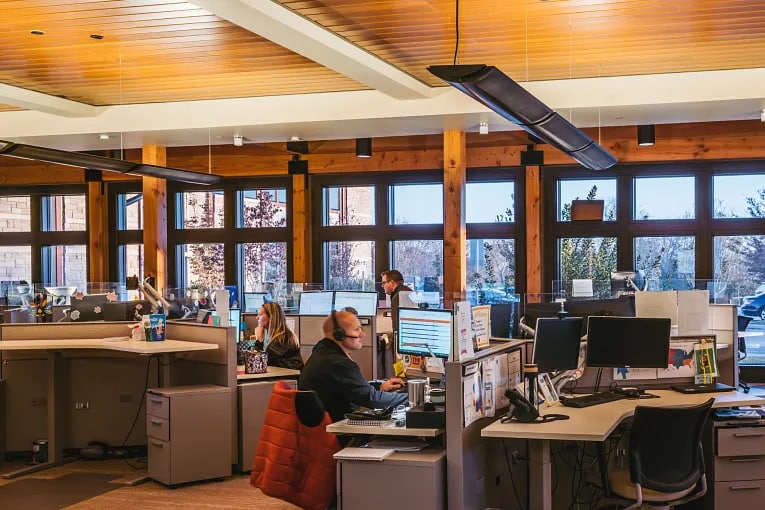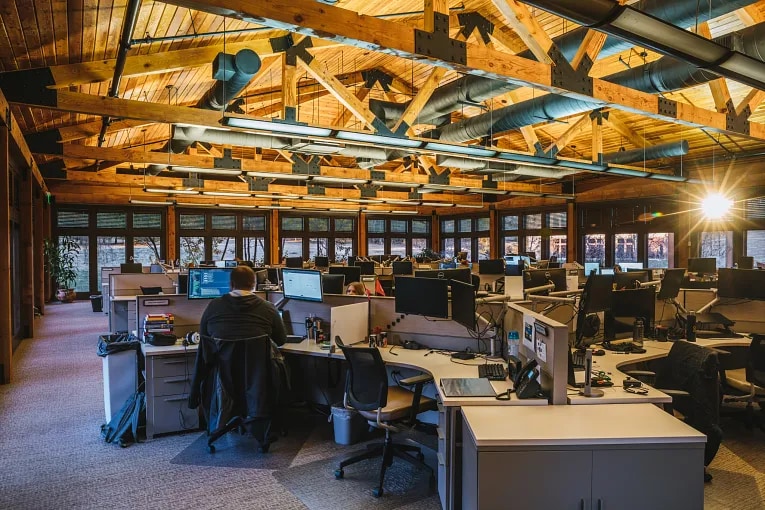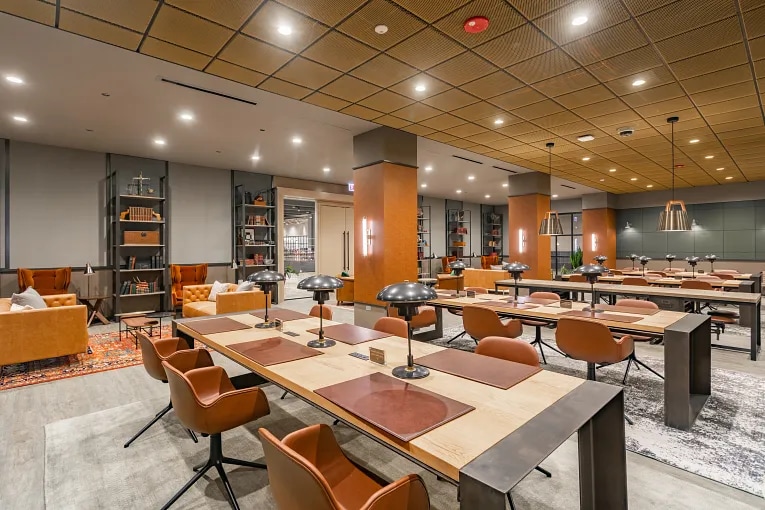What is a Coworking Space? Flexible Office Solutions for Small Businesses

What is a Coworking Space?
Coworking spaces are shared work environments where individuals or teams from different businesses can work independently or collaboratively. These spaces typically offer essential office amenities like WiFi, meeting rooms, and office supplies, making them suitable for businesses of all sizes.
Renting a coworking space allows businesses to access a professional workspace without the overhead of maintaining their own office. Property owners can capitalize on increasing coworking space demand by utilizing coworking spaces to attract a broad range of tenants, from startups to hybrid teams.
Types of Coworking Spaces
Coworking spaces come in several forms, each designed to meet different business needs. Below are just a few examples:
- Open workspaces are ideal for startups and freelancers who value flexibility and collaboration.
- Private offices offer more privacy, making them suitable for small teams or businesses that need a dedicated space.
- Industry-specific spaces cater to professionals in fields like tech or design, providing tailored environments.
For those considering shared workspaces, understanding the pros and cons of subleasing can be crucial, as many coworking arrangements operate under sublease structures. Renting different types of coworking spaces allows businesses to match their needs with the right environment, from open desks to private offices.
Advantages of Renting a Coworking Space
Renting a coworking space provides several key benefits beyond just flexibility. For small businesses and freelancers, coworking spaces offer access to a professional environment with amenities like meeting rooms, high-speed internet, and office services without the burden of managing them. This is especially useful for business owners or freelancers who need a professional setting to invite clients for meetings, creating a more polished and credible impression.
When considering coworking, it's essential to understand the costs of renting coworking space, which are typically lower than maintaining a traditional office. Additionally, for those unfamiliar with how to lease an office space, coworking offers a straightforward alternative with fewer logistical hurdles.
Lastly, for businesses needing to customize their workspace, a tenant improvement allowance can help tailor the environment to specific needs, offering even more control over the space.

Coworking vs. Traditional Office Leasing
The main difference between coworking spaces and traditional office leases is the lower financial commitment. Coworking spaces offer businesses the ability to lease short-term, making them ideal for startups and companies looking to scale quickly. Unlike traditional leases that often lock businesses into long-term agreements, coworking provides adaptable solutions for teams of any size. For property owners evaluating returns, it's also important to consider debt yield, which can help assess the profitability of coworking leases.
Businesses looking for a workspace solution should explore the differences between coworking vs. offices to determine which option fits their growth strategy.
How to Choose the Right Coworking Space for Your Business
Location Strategy
Choosing the right coworking space involves more than just looking at the basics. Location strategy is critical-consider how close the space is to your clients, partners, or industry hubs. Accessibility is another factor; ensure the space is convenient for employees, with access to public transportation or parking, and evaluate the neighborhood's safety and reputation for both employee and client comfort.
Financial Considerations
Financial considerations go beyond the monthly lease. Factor in the total cost of occupancy, including hidden fees and services. Compare these costs to traditional office leases in terms of ROI, and investigate if there are any tax benefits or incentives for using shared spaces.
Branding and Image
The coworking space should also reflect your company's branding and image. Can you customize or brand your area within the shared space? Assess the quality of common areas for client meetings or events, ensuring they align with your company's professional image.
Productivity and Amenities
Lastly, consider productivity factors, such as noise levels, access to quiet zones or focus areas, and the presence of ergonomic and natural light considerations that can boost employee focus and well-being. Sustainability and wellness amenities, such as green certifications or fitness options, are increasingly important in choosing a space that aligns with your company's values and employee health.
The Future of Coworking Spaces and Renting Trends
Coworking spaces are rapidly evolving to meet the needs of a shifting workforce. As hybrid work models become the norm, more businesses are turning to coworking leases. For business owners and investors considering the profitability of coworking spaces, the growing demand for coworking spaces presents an opportunity to capitalize on these flexible renting trends.
However, as coworking grows, businesses must also be prepared to navigate common challenges in coworking spaces. Issues like managing privacy, balancing community interaction, and ensuring adequate infrastructure for remote teams are critical for long-term success.
On the financing front, as more businesses seek flexible workspace solutions, the demand for financing options such as commercial real estate loans continues to rise. These loans can help property owners expand or retrofit existing spaces into coworking environments, further supporting the growth of the coworking sector.
As the coworking model continues to gain traction, investors and property owners should also consider how future-proofing strategies, like integrating smart office technologies and preparing for potential disruptions, can enhance the long-term viability of their coworking spaces.

Frequently Asked Questions About Coworking Spaces
What are the long-term financial benefits of renting coworking spaces compared to traditional office spaces?
Renting coworking spaces offers reduced capital expenditure since businesses don't need to invest in office furniture, equipment, or renovations. Shared utilities and maintenance also lower operational costs, as companies share expenses like IT support and office services. Coworking spaces help mitigate risk by offering flexibility to relocate or downsize without breaking long-term leases. Additionally, businesses are less exposed to real estate market fluctuations, reducing financial uncertainty.
How can I assess the demand for coworking spaces in my local market before renting or investing?
To assess demand, start with market research by analyzing local job growth, startup activity, and freelancer trends. Competitive analysis of existing coworking spaces and their occupancy rates can also provide valuable insights. Surveying potential users like local businesses and freelancers will help gauge interest and identify desired amenities. Finally, reviewing industry reports and monitoring local real estate market conditions will give a comprehensive view of coworking demand.
What factors should I consider when selecting a location for renting or investing in coworking spaces?
When selecting a location, consider accessibility, such as proximity to public transportation and parking availability. Evaluate the neighborhood's safety, reputation, and available amenities like cafes and gyms. Proximity to business centers and target user groups like freelancers and startups is crucial. Additionally, consider the building's condition, zoning regulations, and long-term growth potential for both the space and the surrounding area.
Actionable Steps for Investors
Coworking spaces offer a flexible, scalable, and cost-effective solution for businesses navigating the evolving work environment. To leverage this opportunity, investors should identify the specific needs of their target market and select spaces that align with those requirements. For actionable tips, review our guide on what to look for when touring a coworking space to ensure you choose the right location.
Ready to find the perfect coworking space? Explore the diverse options available and discover coworking spaces for lease across the US to take the next step towards a more adaptable business model.
